Free digital copy
Get Speciality Food magazine delivered to your inbox FREE
Get your free copy
Yorkshire (one of England’s biggest counties), is a producer’s dream. A landscape reaching from undulating countryside, encompassing vast swathes of pasture and craggy hilltops, Eastwards to a coastline swathed in mythology, heritage and history.
It is a county of brewers, bakers, dairies, farmers and distillers. One which has irrevocably evolved, particularly in the past 20 years, to become a stronghold of artisan excellence. A source of national pride on the British food and drink scene.
“The beauty of Yorkshire is, because of its size, it’s got so much variety,” agrees Jenny Palmer, a board member of Deliciously Yorkshire – the organisation responsible for championing the county’s produce. “We’ve got the coast, the Wolds, the Dales, the Moors. Everything from fish to meat and cheeses, with consistently high quality across the board. We have incredible cheeses, with real variety in the types as well, and there are a lot of coffee roasters here now, which is brilliant.”
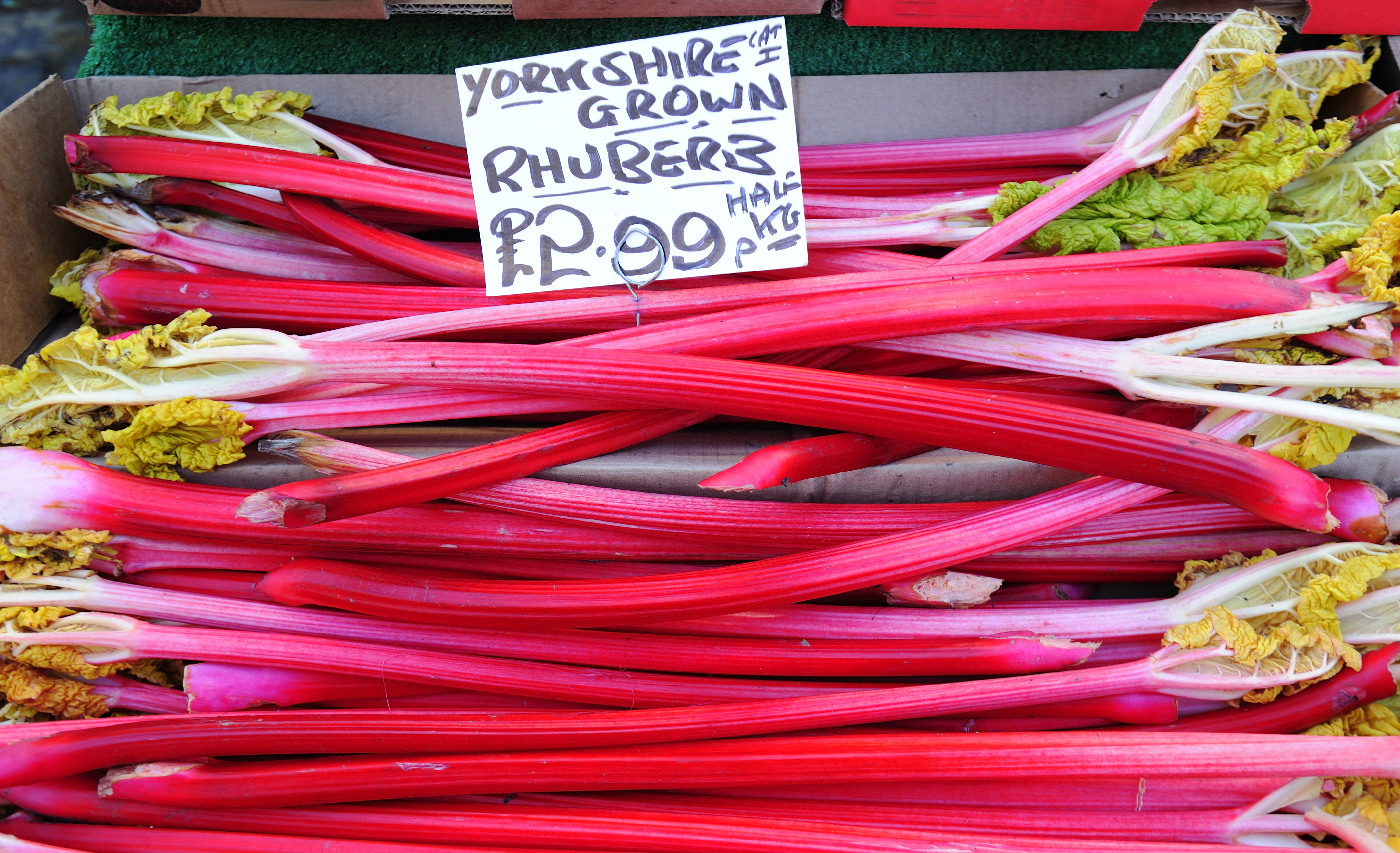
Trying to pinpoint exactly what makes Yorkshire special is difficult, but comes down, Jenny thinks, to the county’s versatility. “We produce everything from Yorkshire rhubarb, to tomatoes,” continues Jenny. “There’s real diversity of the soils which can lead to a lot of different things being made here. We are on the Wolds, and what we can grow is completely different to what the Dales can grow.”
“I’ve enjoyed a front-row seat to the vibrant and rapidly-evolving Yorkshire food scene after growing up in our family cheese business here and being involved in the regional food group, originally called Yorkshire Pantry, and latterly rebranded Deliciously Yorkshire,” says Caroline Bell, co-director of Shepherds Purse. “I had a stint in the tech industry too, and travelled around the world, which gave me a greater appreciation of both the British food scene and that of my home county.”
Since the start of Shepherds Purse in the late 80s, to the present day, Caroline says she’s lived through huge changes in the broader Yorkshire food scene. “In the 80s ultra processed food was gaining traction in Yorkshire as it was in the developed world, although I believe the traction it was gaining also inspired a response too,” she says. “There has been a marked increase in small-scale producers, like ourselves, with emphasis on artisanal techniques and local sourcing. This has been supported by the tireless work of Deliciously Yorkshire and the encouragement of small to medium farms to diversify. This trend aligns with a broader national and global movement toward sustainable and ethical food production and a growth in farm shops, a vital support for smaller producers.”
Caroline feels the county’s food scene has become more cosmopolitan and exotic during her time in the industry, reflecting ever-changing cultural influences within the region, as well as the increase in foreign travel.
“Overall, the Yorkshire food scene has transformed for the better over the past 35 years. It’s vibrant, diverse, rooted in tradition whilst also embracing innovation and new cultures and long may this continue. Going forward I think the focus will be on sustainability and regeneration in the supply chain, and this should bring with it education and empowerment for future generations to cook and create with raw or minimally processed ingredients,” she says. “This would bring even more connection with local food producers and farmers and support for them through procurement initiatives designed not only to feed the nation but nourish it.”
If there’s one place that typifies the tapestry of excellence running through Yorkshire’s food and drink community, it’s Fodder. Found in Harrogate, just outside the entrance to Great Yorkshire Showground, the farm shop and cafe is operated by Yorkshire Agricultural Society, and in many ways is a ‘shop window’ into what the county has to offer. Almost everything visitors can eat or buy is proudly made in Yorkshire, with every nook and cranny (even wall space, where artwork nods to some of the shop’s longest serving suppliers) taken up by something delicious.
The shop has been in operation for 15 years, says manager Vanessa Pitt. “It was set up to support farmers and local producers when the country was going through Mad Cow Disease and the government said they had to diversify. Today we’ve got over 400 suppliers in Fodder, and we support as many local and independent businesses as we can, and if we can’t get it locally, we say it’s the ‘best of the rest’.”
Many producers have been with Fodder since the beginning, including Ian Taylor Free Range Eggs, and Lotty Shaw’s, which makes its sticky, treacly parkin in Halifax. “A lot of them have started with us and grown with us across the years. If they hadn’t been with us, I don’t think they would be as big as they are now,” says Vanessa, adding that Yorkshire Agricultural Society makes a point of helping as many independents as it can, even offering grants to help would-be producers get off the ground, such as Just Jenny’s ice cream, and Yockenthwaite Farm Granola, who are then taken into the shop, once established, as suppliers.
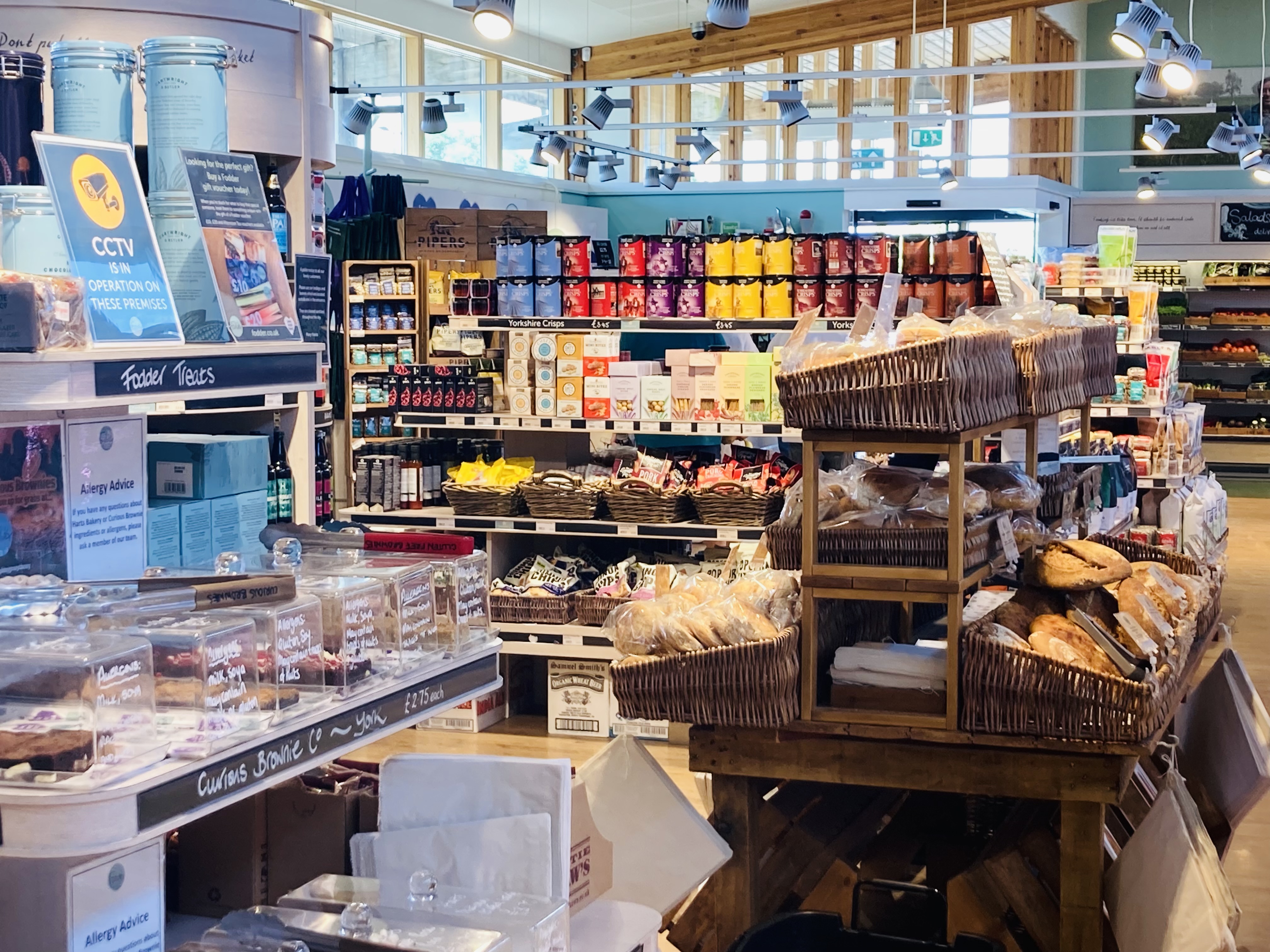
Vanessa says Yorkshire Agricultural Society is “very supportive”, not just of producers, but farmers and agriculture as an industry too. “All our money and profit goes back into our charity and we support farmers that way. We do health checks around their sites, lunches and dinners to get them together to talk about issues like the weather. We do a lot for farmers,” she explains.
On the county’s food scene, though its probably best known for the Rhubarb Triangle, where the striking candy pink vegetable squeaks and creaks as it grows in the dark, lit only by candlelight, Vanessa says there is so much more retailers need to be aware of with too many highlights to count. “You can get everything from Yorkshire now! More and more food is being produced here, and more people have diversified over the years.”
Her stalwarts include Botham’s of Whitby, Sawley Kitchen, Yockenthwaite Farm Granola, Mason’s gin and Longley Farm in Huddersfield. “We’ve got one of their biggest ranges of yoghurts,” Vanessa says.
A new brand she’s excited about is The Yorkshire Kitchen. “We just got them in. They started out last year with some sweet butters for Christmas and now they make savoury ones too. They work really well for us because we can also sell them on the butcher’s county with the steaks.”
And those fly out the door, with Vanessa saying there’s a clear demand right now from consumers for good quality, local meat. “They want to know where it’s from. We’ve definitely seen an uptake in that, and vegetables. People want quality produce, and they don’t mind paying to have their quality.”
What makes Yorkshire such a hotbed for fine food and drink? For Vanessa and the rest of the Fodder team it’s clear. “It’s the area where it’s from. We’ve got so much to be proud of. There are so many suppliers out there doing great things. And when you come to a show like Great Yorkshire Show, you can see the passion from everybody that’s coming through.”
Yorkshire can lay claim to being one of the most significant dairy counties in the UK, as home to Wensleydale – made famous in recent history by the Wallace & Gromit animations.
Caroline says there is a great deal to celebrate when it comes to Yorkshire produce…especially cheese.
“When we started making blue cheese and launched Yorkshire Blue in 1993/4, there hadn’t been a blue cheese made in Yorkshire since the 60s, and now we enjoy such a rich diversity of cheeses made across the region.”
Cheesemaking, Caroline says, dates back centuries in Yorkshire “as it does across the world”, with significant contributions from monastic communities. “Medieval monks, particularly those from Cistercian and Benedictine orders, were instrumental in developing and refining cheesemaking techniques in the region. Their meticulous record-keeping and dedication to high standards laid the foundation for Yorkshire’s rich cheesemaking tradition.”
This deep-rooted knowledge and expertise “ensures that the cheese produced is of exceptional quality and hasn’t changed today”.
Shepherds Purse is, Caroline says, one of many Yorkshire cheesemakers that has looked to the past, blending traditional methods with more innovative techniques to create modern and unique varieties.
“We have the famous, traditional Kit Calvert Wensleydale still being produced in Hawes by Wensleydale Creamery. We’re also home to Yorkshire Pecorino, with Mario blending his Italian heritage with local agriculture. There’s Yorkshire Dama, with Razan being inspired in the same way, producing cheeses that she’d loved at home in Syria from the exceptional milk supply she has access to in her new home of Yorkshire.”
It’s “great to see the preservation and reinvigoration of our classic Yorkshire territorial cheese and then the innovation of new and distinct cheeses by a range of cheesemakers across the region.” This is vital, says Caroline. “The collaboration and support that exists among cheesemakers is the thing that makes this industry so unique and really very special.”
“Yorkshire has such a fantastically diverse story to tell about the quality food produced across all four corners of our county, from grass-fed lamb in the uplands of the Yorkshire Dales to the bountiful veg from the vast swathes of productive arable land in the East, and everything in between,” says Allister Nixon, CEO of Yorkshire Agricultural Society, organiser of the Great Yorkshire Show, and a registered farming charity.
For Allister, the opportunity to showcase the brilliance of Yorkshire’s growers and makers, is one of the very best things about the annual show, which really brings those stories to life. Those of “small family-run farms exhibiting livestock in the show rings, and of independent food and drink producers offering an incredible array of delicious locally produced food and drink in the Food Hall.”
Put together Allister adds it’s “a compelling reason for supporting and sourcing Yorkshire produce, and it is why the Yorkshire Agricultural Society is proud to work closely with regional food and drink group, Deliciously Yorkshire to champion local producers.
“If the UK is serious about addressing food security, improving public procurement of British food and reducing food miles to meet net zero targets, then Yorkshire has a huge role to play in supplying quality food and drink for the nation from farmers and food producers who are embracing environmental challenges and continuing to innovate in an ever-changing world.”
During our visit we spent a great deal of time talking with some of Yorkshire fabulous producers, who share their stories here…
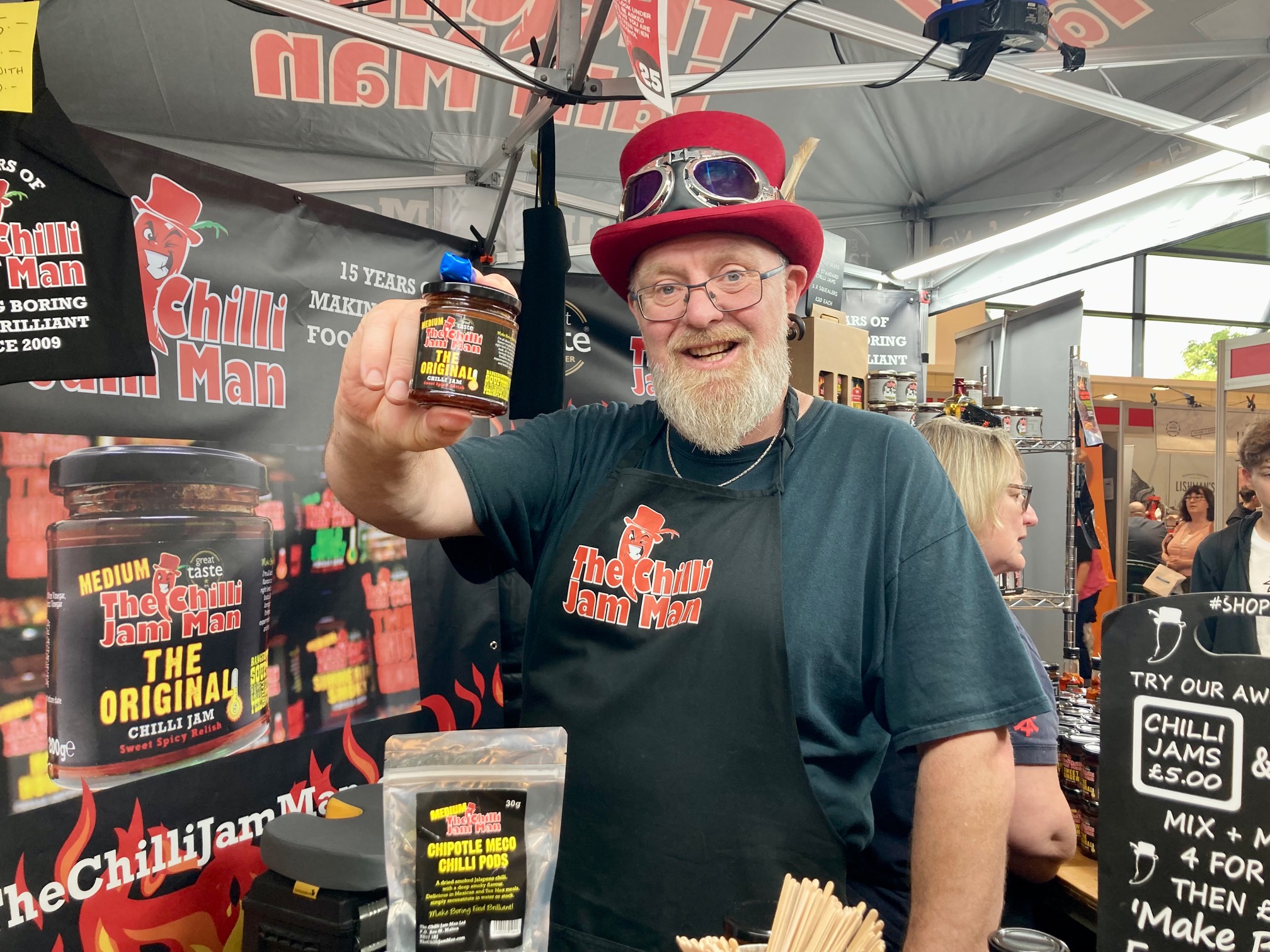
Simon Barrett set up a tiny market stall in Yorkshire 15 years ago, having left the financial sector during the recession of 2008…and he hasn’t looked back.
From a clutch of just a handful of products, Simon now makes more than a dozen chilli jams and preserves, inspired by his time living in Australia.
“I lived there in the 90s for about five years and got very into Southeast Asian flavours and proper heat. When I came back to the UK it was like someone had chopped my right arm off! I started off making batches for myself and giving the rest to friends, and it went from there really,” he says. “The way this has grown astounds me.”
Simon’s range includes chilli jams ranging from the meek and mild, to intensely fiery, using the very best fresh and slow-dried chillies, including authentic chipotle from Central America, smoked over pecan wood. “The other difference between my products and what you’ll find in the suprmarkets is I cook mine on rolling boil over five or six hours – that reduction of the tomatoes and the vinegars and the sugar, the garlic, ginger and chillies means you end up with a very flavoursome product, filled with umami.”
He says shoppers have become more adventurous when seeking out chilli products, and are no longer afraid to dial up the heat, using his jams for enhancing the spice profile of stir fries, curries and chillies, or as a seasoning at the end of cooking. They’re no longer just a ‘bit on the side’.
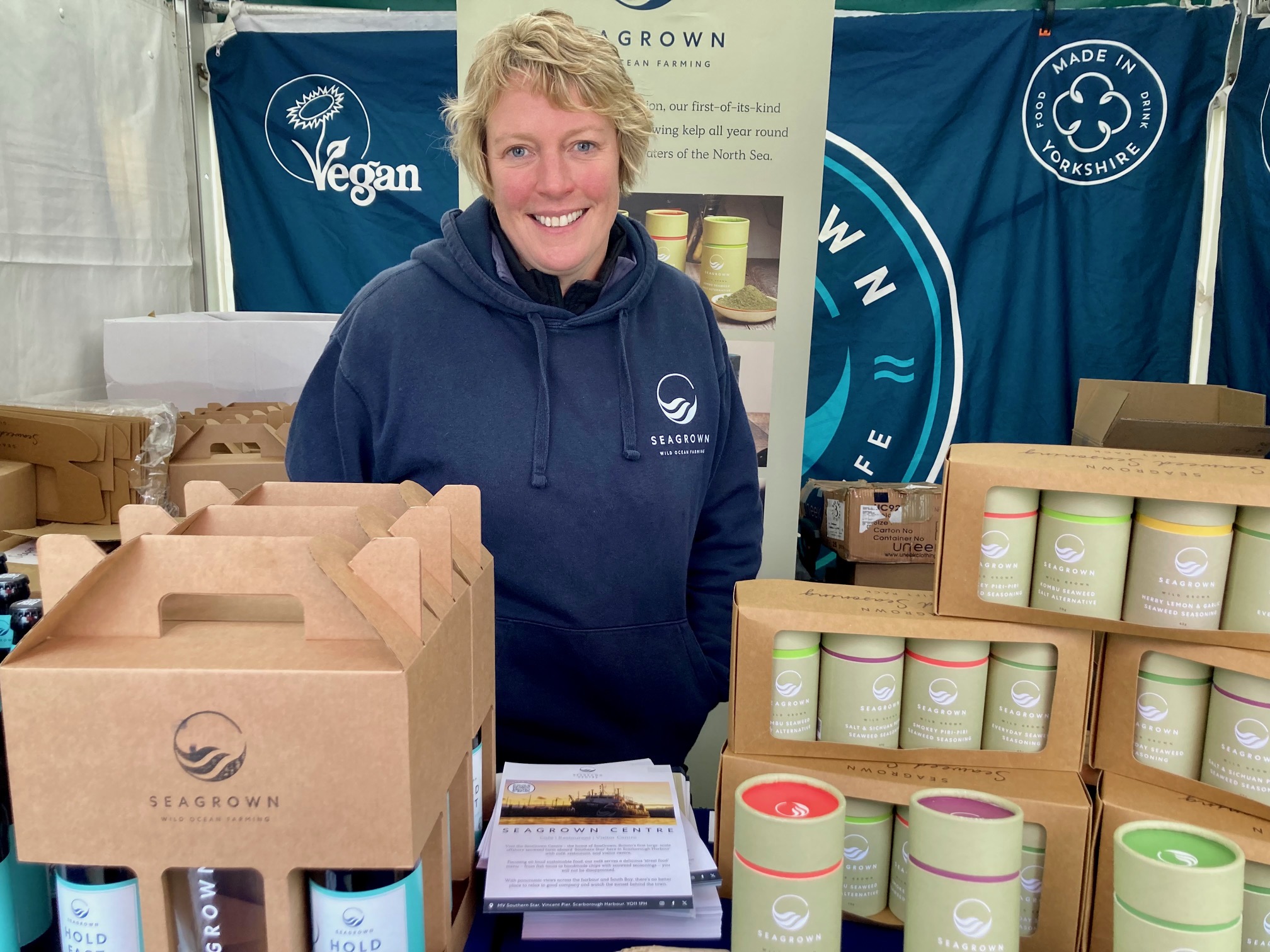
Four miles out to sea, off the Yorkshire coastline, a little foodie revolution is happening, as SeaGrown pioneers what the future of British seaweed looks like.
Owners Wave (who was formerly in the Navy) and Laura (a professor whose field of interest includes oceans and the climate) have “brought their knowledge together to show how brilliant seaweed is for sustainability and the environment,” says SeaGrown’s Jo Holborn.
“It’s a powerhouse,” she continues. “The only challenge in Europe is you could never really do it at scale, but they’ve devised a system to do it off-shore, near Scarborough.”
The brand grows three types of kelp, which find their way into savoury, umami-rich natural seaweed seasonings in original, piri piri and lemon and herb flavours and more – ideal for bringing a touch of salinity to everything from fish and chips to pasta dishes.
With the local fishing industry in decline, SeaGrown is seeking to help fishermen and women convert into the burgeoning offshore seaweed industry, and is doing its bit for the planet too. “Seaweed doesn’t need land to grow,” says Jo, “and it takes up 20 times more carbon than trees.” The farm, she adds, teems with wildlife, with studies ongoing into the biodiversity they’ve been able to foster there.
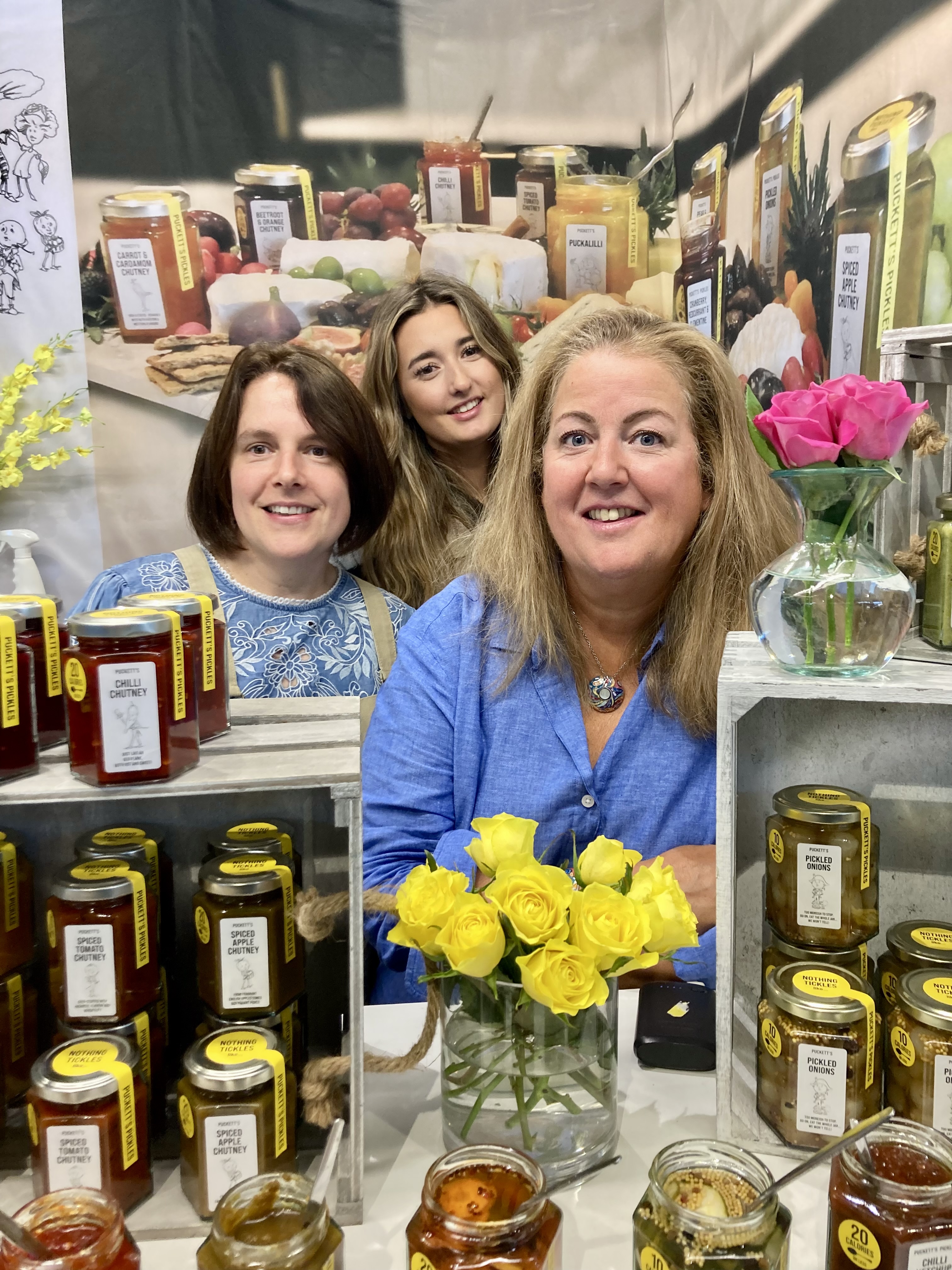
Sarah Puckett uses as many Yorkshire grown and British ingredients as she can get her hands on for her pickles and preserves, which are all the more flavoursome for the inclusion of freshly roasted and ground spices.
Inspired by her great great grannies, who would cook with the myriad weird and wonderful ingredients their seafaring husbands returned back to Britain with, Sarah set up the business 11 years ago, with just two study pots and wooden spoons. Today her creations, including her great granny’s Carrot and Cardamom Chutney, or Pea and Mint Ketchup can be found on the shelves at retailers including Selfridges.
“They’re popular, I think, because they are literally just fruit and vegetables with nothing artificial added. We make them in small batches and everything is really fresh. A customer favourite is the Puckalilli (based on her granny’s recipe). “And my favourite at the moment is the Gooseberry and Orange Blossom Jam, it’s just so lovely in the morning with Greek yoghurt.”
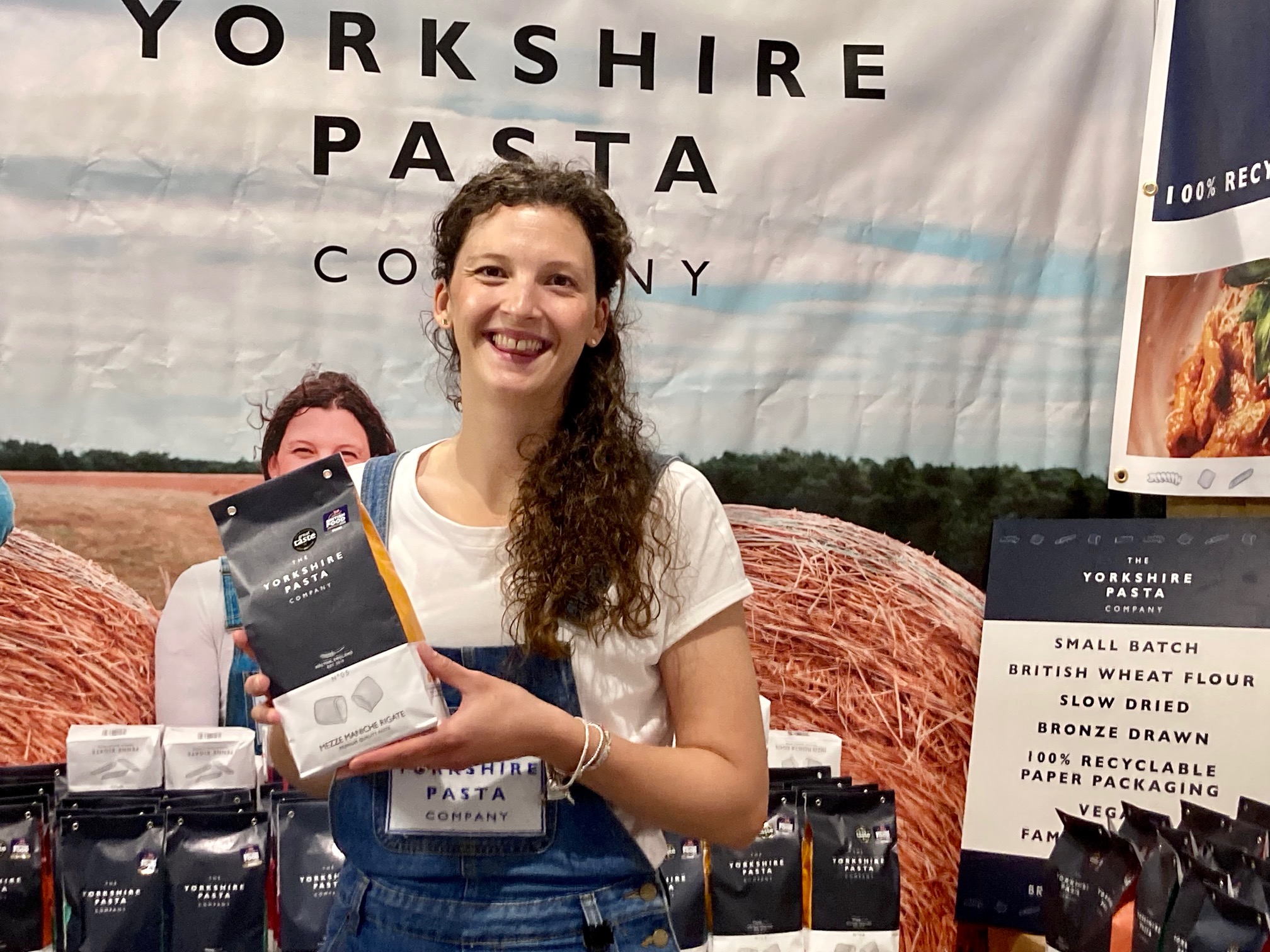
Having tried authentic Italian pasta, discovering just how much it differed from what supermarkets had to offer, The Yorkshire Pasta Company founder Kathryn Bumby set off on a three-week journey from Tuscany to Rome, visiting restaurants, factories and makers to understand the secret to great pasta, launching the award-winning business on her return.
“I just really fell in love with pasta,” she says. “Ours, rather than being made over two hours in a big factory, is made over two full days, and dried overnight on wooden racks. It’s a bit like bread and beer. You get so much flavour from the wheat.”
The range, which includes family favourites such as penne, contains just flour and water. “And the key to its texture is, rather than making the shapes with plastic moulds, we use bronze, which gives it an incredible texture. When you stir in your sauce it cuddles and clings to it. It’s amazing,” Kathryn adds.
She’s proud of the brand’s sustainable credentials too. “Ours is made with Yorkshire flour, using solar energy, and sold in paper packaging with beautiful illustrations on the outside to show what’s in the pack.”
Feedback has been brilliant. “We even have a massive following of Italians who tell us they send it back home!”
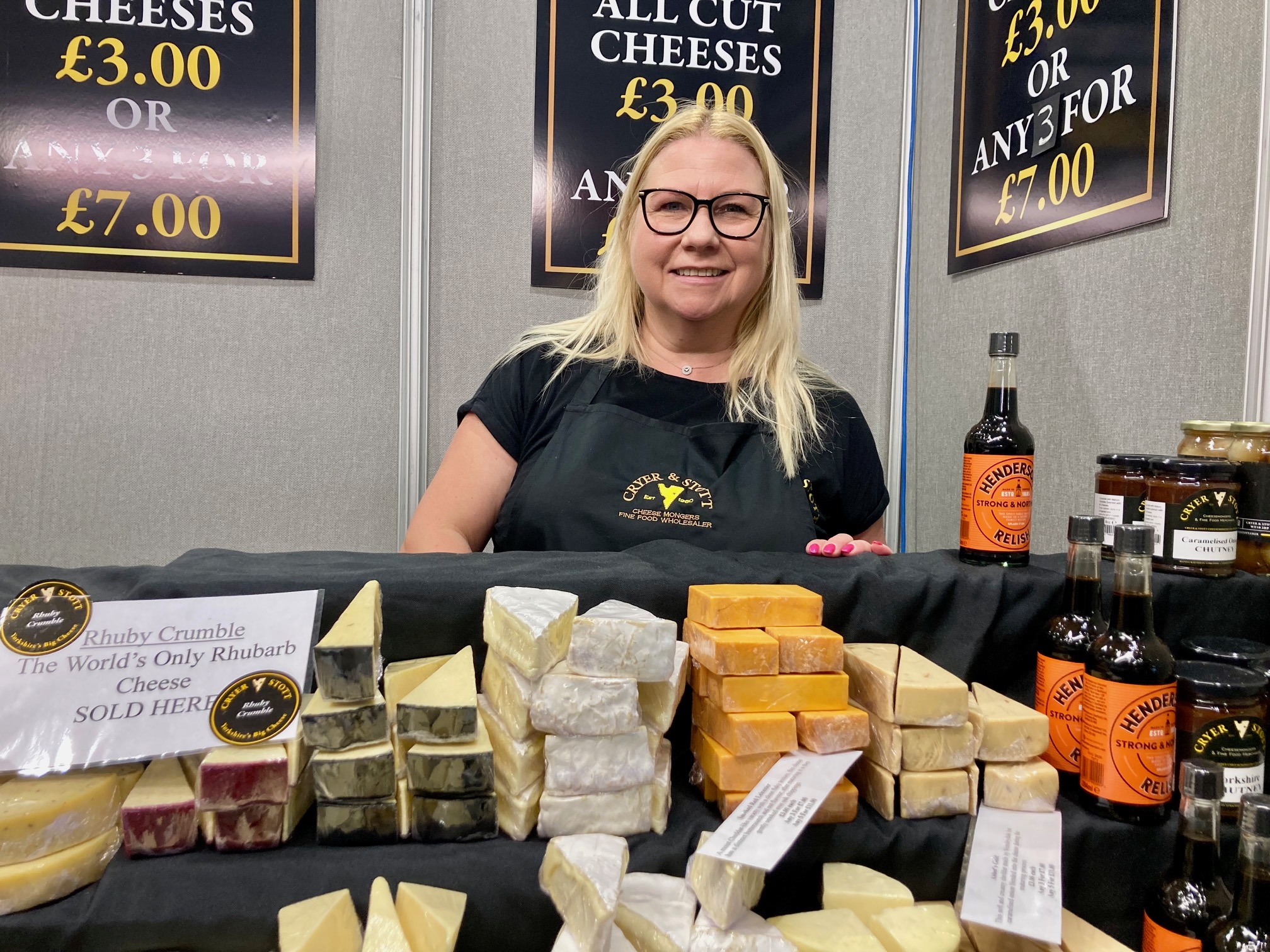
Made in Sheffield, Henderson’s Relish is one of Yorkshire’s most recognisable exports. Combined with Yorkshire Red cheese, it forms Sheffield Forge – a bestseller for cheesemonger and fine food purveyor Cryer & Stott, whose range is steeped in Yorkshire flavours and history.
Owners Clare and Richard Holmes started 26 years ago with a provisions stall in Wakefield market, before turning their hand to creating their own range of unique speciality cheeses.
“We decided to do a cheese for Wakefield first,” Clare says, “and we came up with Rhuby Gold, which was a sheep’s milk cheese with rhubarb through the middle – a bit like a Victoria sandwich. We did that for a few years and found that sheep’s milk was seasonal, so when we wanted to sell a lot of it we couldn’t, so we came up with Rhuby Crumble, which is cow’s milk cheese with rhubarb and vanilla through it.”
The variety of cheese is extensive, and includes Lillibet (a blue made to celebrate the Queen’s Platinum Jubilee), Wave (with Scarborough seaweed), Yorkshire Cask (with wholegrain mustard and Yorkshire beer) and King Charles (Scottish Cheddar with truffled mushroom in a nod to the king’s favourite dish, mushroom risotto).
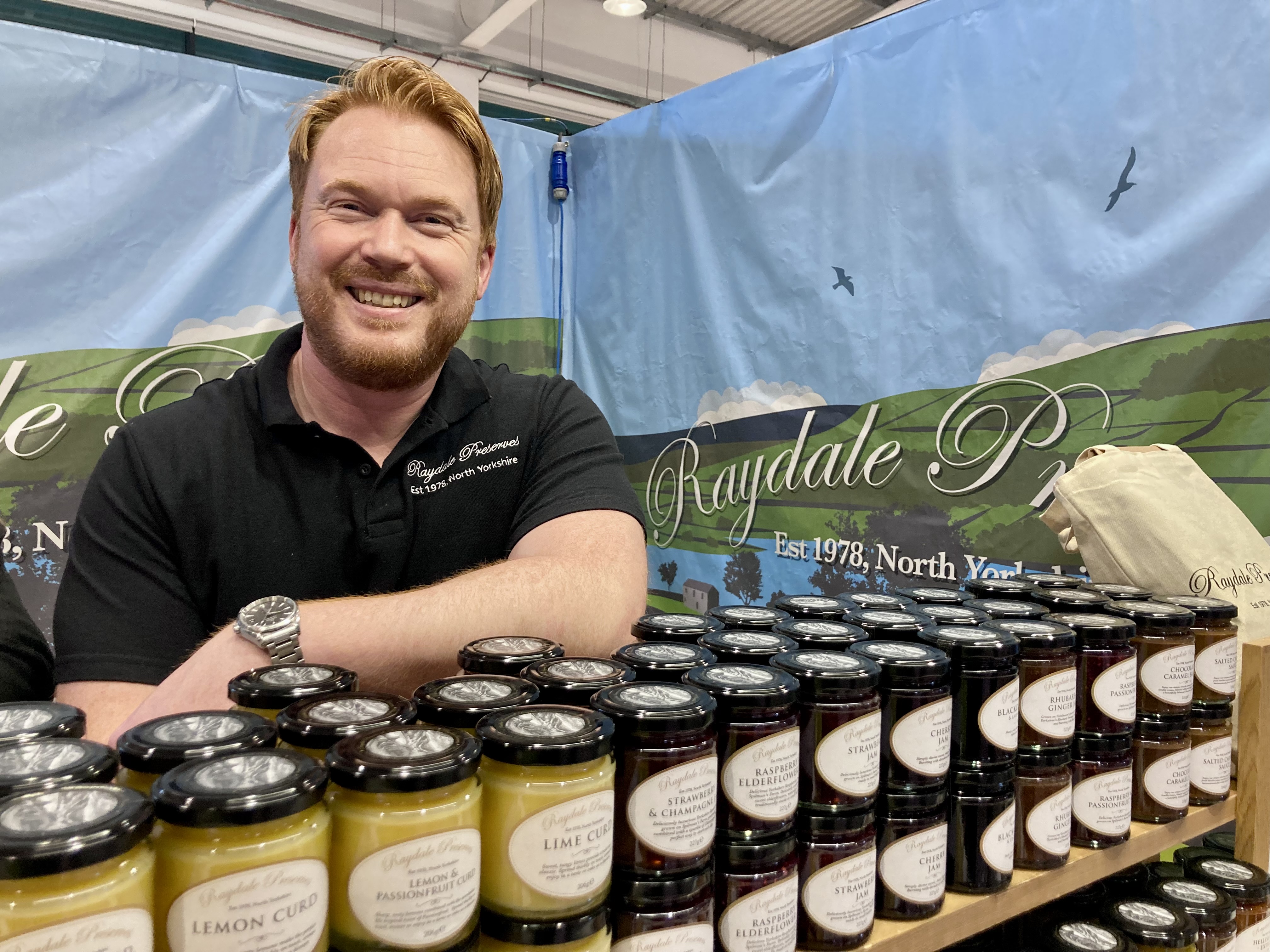
Raydale makes dozens of jams, curds, jellies and marmalades…but incredibly started out as a sheep farming business, says the brand’s Andrew Kettlewell, with the family diversifying in 1978. “We started off doing farmers’ markets, and when I took over in 2008 we began supplying shops and producing for other brands as well,” Andrew continues.
As many British and Yorkshire ingredients as possible land in the jars, including local soft fruits, but the most popular product using a more ‘exotic’ flavouring, with oodles of fresh lemon juice lavished upon the Lemon Curd. Curds have “taken off” this year, leading the brand to add new varieties such as Apple & Cinnamon and Cherry & Chocolate.
“I think they’ve become popular because of Bake Off and various Netflix baking series,” says Andrew, who adds their bestseller with retailers is the Red Onion & Apple Chutney, which is especially in demand at Christmas.”

The creamery takes its role as custodians of a 1,000-year history of cheesemaking in Yorkshire very seriously, says marketing manager Sandra Bell. “We believe it’s important for brands like Wensleydale Creamery, underpinned by heritage and provenance, to champion and lead the way for cheesemaking in the region, encouraging more consumers to buy locally made produce,” she adds.
Wensleydale Creamery, nestled in the rolling hills of Wensleydale in the heart of the Yorkshire Dales National Park, is a key part of the county’s dairy industry, and a symbol of the region’s dedication to excellence. “Testament to this,” says Sandra, “are the many awards won, this most recent being at this year’s Great Yorkshire Show, where our Yorkshire Wensleydale was judged to be Best Territorial Cheese, and took the title of Reserve Supreme Champion Cheese.”
The cheesemaker sources its milk from a dedicated group of Red Tractor assured family farmers, whose skill, hard work and passion is reflected in the quality of the finished product – including Yorkshire Wensleydale. traditionally known for its creamy, crumbly texture. “PGI status qualifies the authencity of our Wensleydale and helps give our customers assurance that they are buying the original Wensleydale cheese that is handcrafted right here in Wensleydale,” adds Sandra.
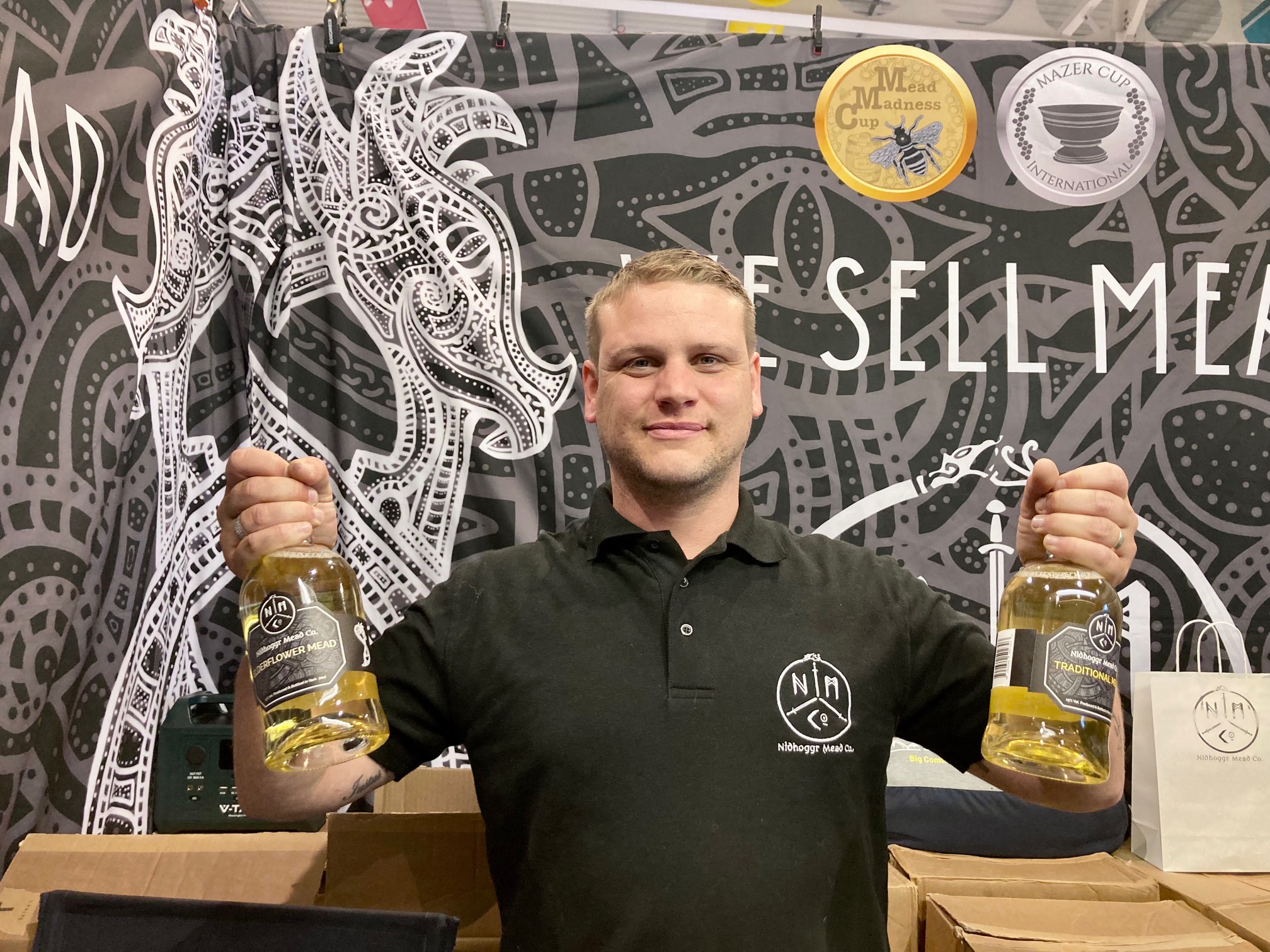
“Mead as a category is growing exponentially,” says Nidhoggr Mead founder Peter Taylor, who started the business in his back bedroom nearly four years ago, and is now one of the biggest honey mead producers in the UK, supplying a number of tourist attractions, being the official mead of Warhammer, and exporting around 100,000lts to the US each year.
“There’s a big trend for mead currently,” Peter continues. “A lot of things are stagnating and dropping off in the market, like gin. People want something interesting, and mead is smashing it out of the park. It’s becoming hip again.” The brand sources all its honey from The Apiarist, who has around 3,000 hives dotted across the Yorkshire Moors, with all water sourced from the Swale Valley, and fruit for flavoured varieties selected from local farms where possible. “It’s a proper Yorkshire product,” adds Peter, whose success has allowed him to scale up quickly. “I now have 11 members of staff, 4,000sqft premises and run the largest honey mead company in the UK.”
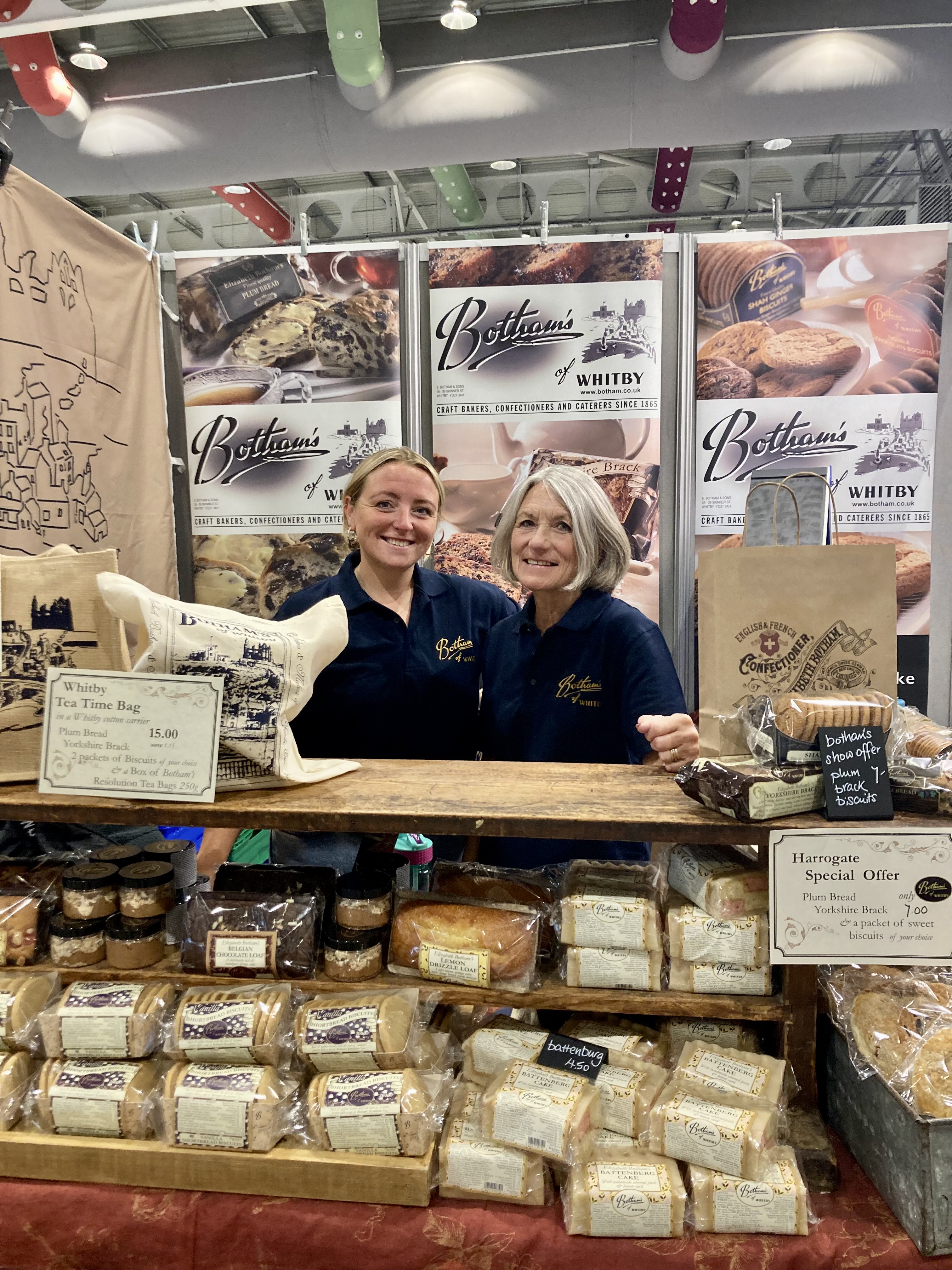
More than 150 years of tradition runs through Botham’s - a trusted family-run business based in the atmospheric coastal town of Whitby. “It started when Elizabeth Botham started baking bread…and that came from a need to feed the family,” says Elizabeth’s great-great granddaughter, Sarah Jarman, who today runs Botham’s alongside her three daughters, two brothers and sister.
“Elizabeth started to make cakes, and took them to sell at a market stand, and developed from that. We still make things by hand. We’re not fully mechanised by any means,” adds Sarah. “Everything’s hand mixed and hand boxed.”
The brand’s most recognised products are its lemon buns, chocolate Japonaise, and gingerbread, which hails from a very traditional Victorian recipe. “But from a retail point of view, what goes best are the biscuits and bracks. The tea loaves. They have a long shelf life and we sell a lot of those.”
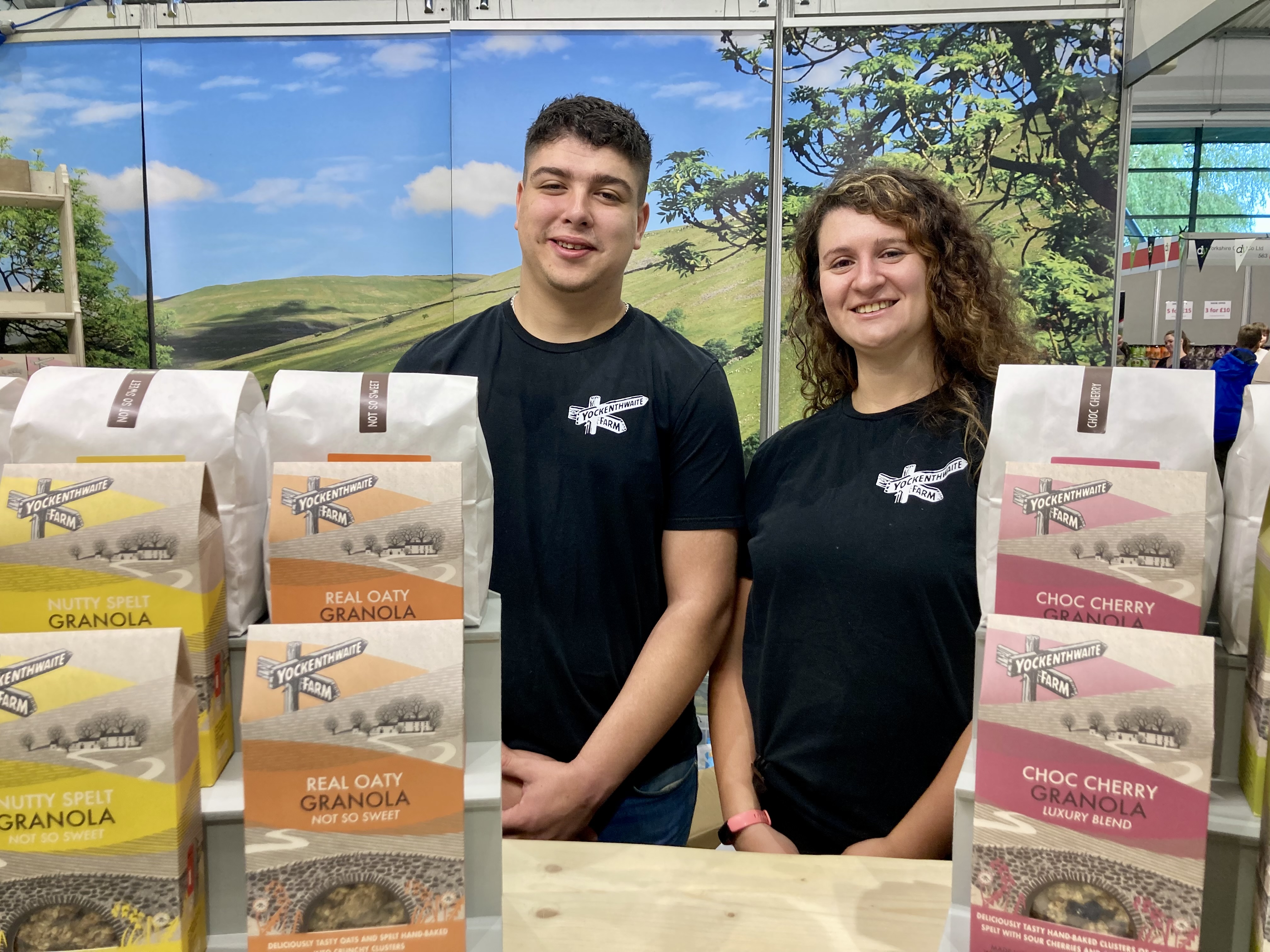
This family-run granola company demonstrates how the simplest homegrown ideas can snowball to success.
“My husband and mother-in-law were running a B&B at Yockenthwaite Farm in the Dales, and wanted to offer an alternative to a full English. Something healthier,” says Lianne Hird. “They started making granola, and it was so successful they took it to a market and sold out. It’s then they realised they had a business, so they got a premises in Skipton, and in 2020 expanded again into bigger premises.”
Lianne puts the success of the brand down to its pure, high quality British oats, and the fact just one product in the range contains sugar, with the rest sweetened subtly with honey.
“The customer favourite is our Nutty Spelt, which contains the ancient grain. It’s followed closely by Just Ginger. That started as a winter edition a few yars ago, and slowly slowly it’s become a firm favourite. We think it’s a bit different to other granolas. Most of them have fruit and nuts, but as far as we can tell no one uses ginger.”
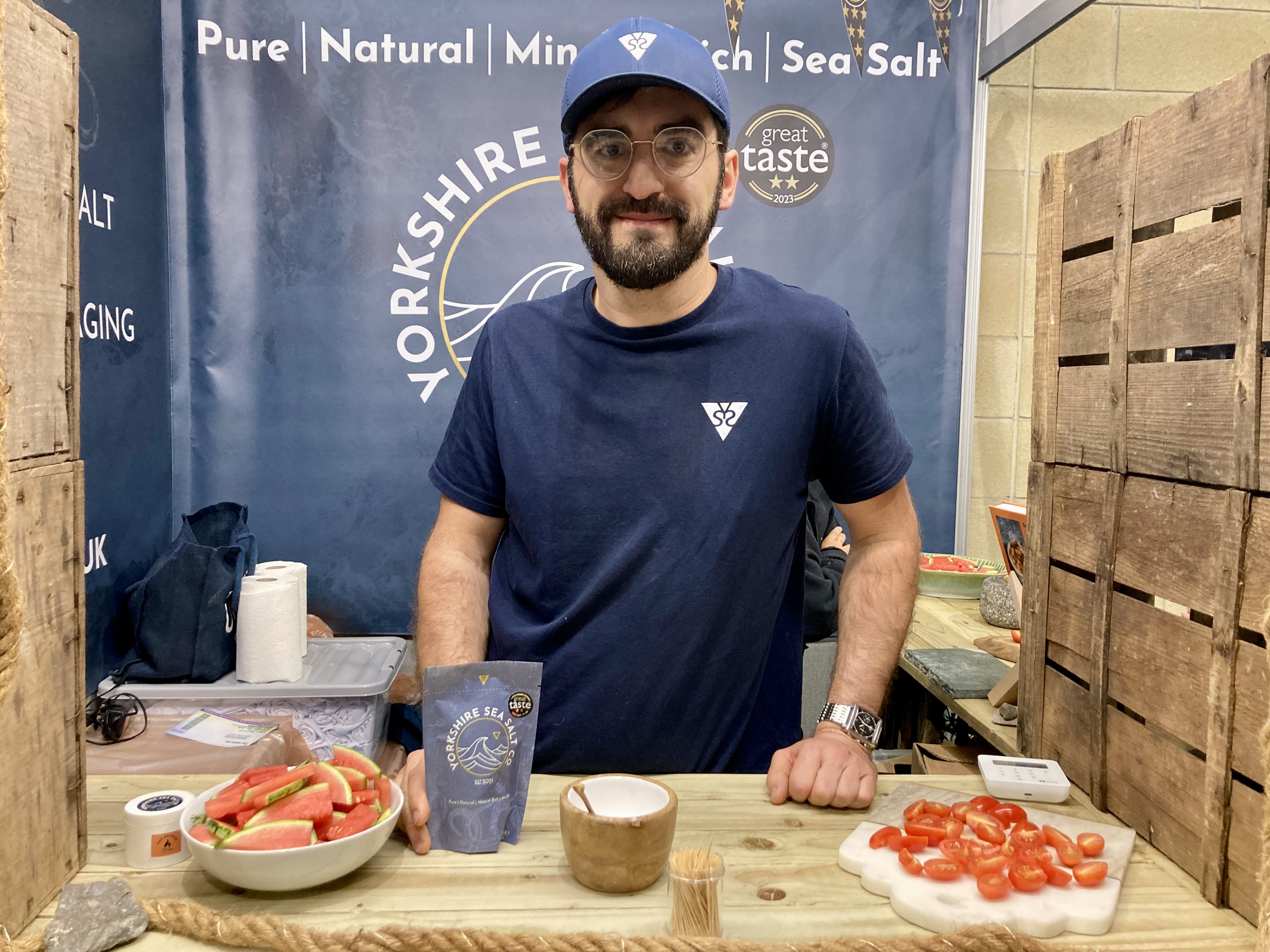
Richard Devany’s tale is a familiar one. He lost his job during the Covid pandemic “and I had nothing to do but sit and read”. After reading about an archeological dig at Boulby Cliff, where the remains of salt production dating back thousands of years were uncovered, his interest was piqued. “I started to look into it and saw nobody was producing salt here, so I got the trademark and brand in 2021 and it took a year-and-a-half to get into production.”
It’s not easy, he admits, to make sea salt commercially. “There are so many elements to it, and no standardised equipment to produce it at scale, so we had to take a lot of equipment and make it suit us.”
Richard harvests along the Yorkshire coast at super high tide to trap the freshest water, which is triple filtered to ensure no microplastics get through. “That’s a big thing these days,” he explains. “We have a zero-plastic policy. Our packaging is non plastic and it’s our policy to remove all plastics from our business.”
Triple filtering, and drying slowly ensures Yorkshire Sea Salt packs a punch, while delivering around 10 to 15% trace minerals compared to rock salt. “It’s a flavour that builds on your palate, and you can use less of it because of that,” Richard adds.
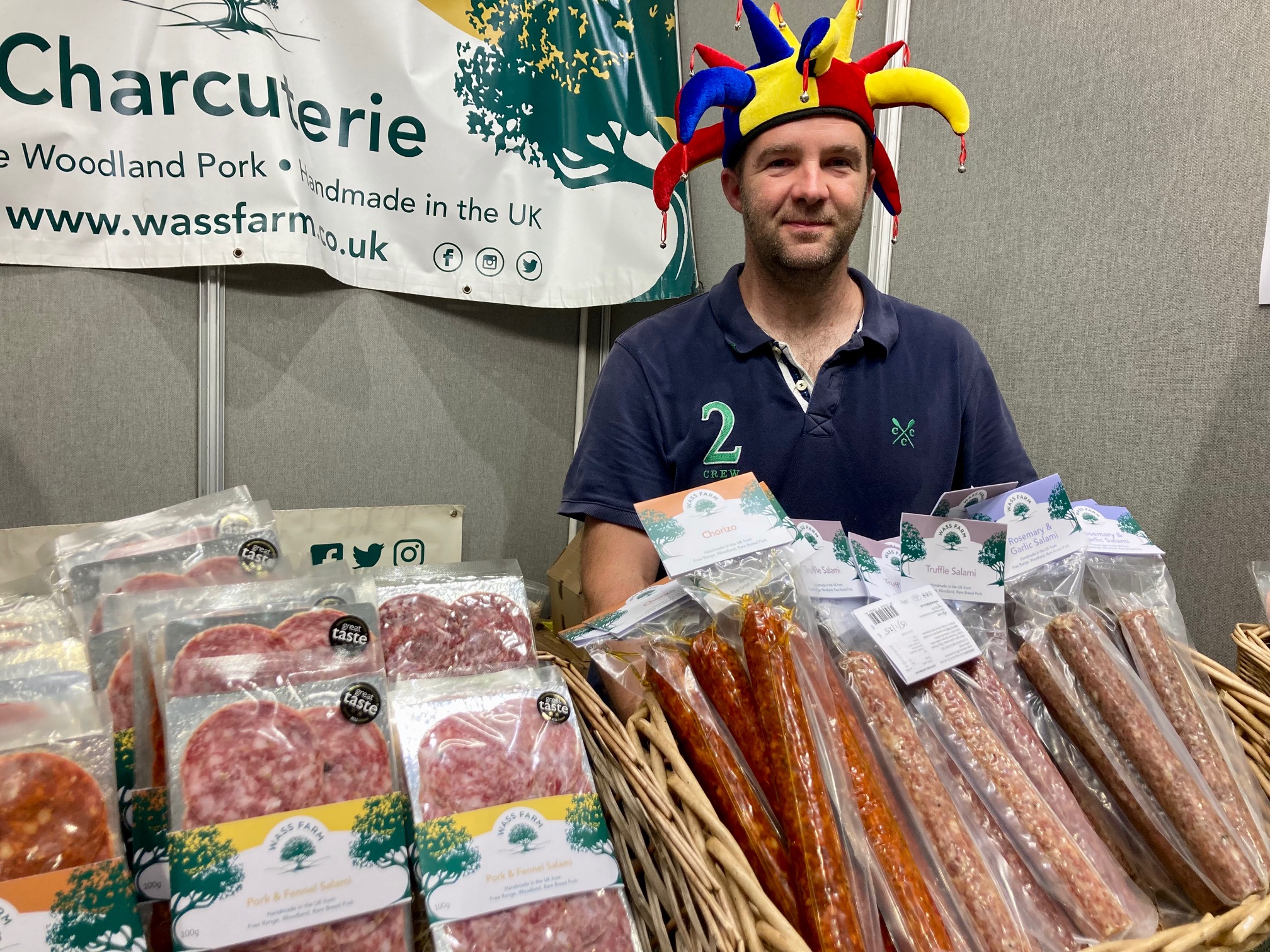
Wass Farm Charcuterie is part of a modern band of British brands making fine salami, coppa, nduja, lomo and more. The brand, rears its own Mangalitsa and Middle White pigs in Yorkshire woodlands, where their rummaging, foraging nature leads to a tastier product.
The Middle White, a traditional Yorkshire pig, is, says Wass Farm’s Nick Taylor, rarer than the Giant Panda, pushed to near extinction due to the rejection in the 20th century of traditional, fattier breeds…which have come around to popularity again today, for their unparalleled flavour.
“Our pigs are antibiotic free, reared on the farm, and spend their time rooting around. That’s supplemented several times a year with Christmas trees from the local Scout group, and apple pulp from the local cider mill down the road,” says Nick.
A salami flavoured with fennel is the brand’s hero product. “And it’s different to supermarket salami,” Nick explains. “Ours are softer because of the fat content in the pigs. You can’t compare it. There’s no scale to compare what the supermarkets do to us.”
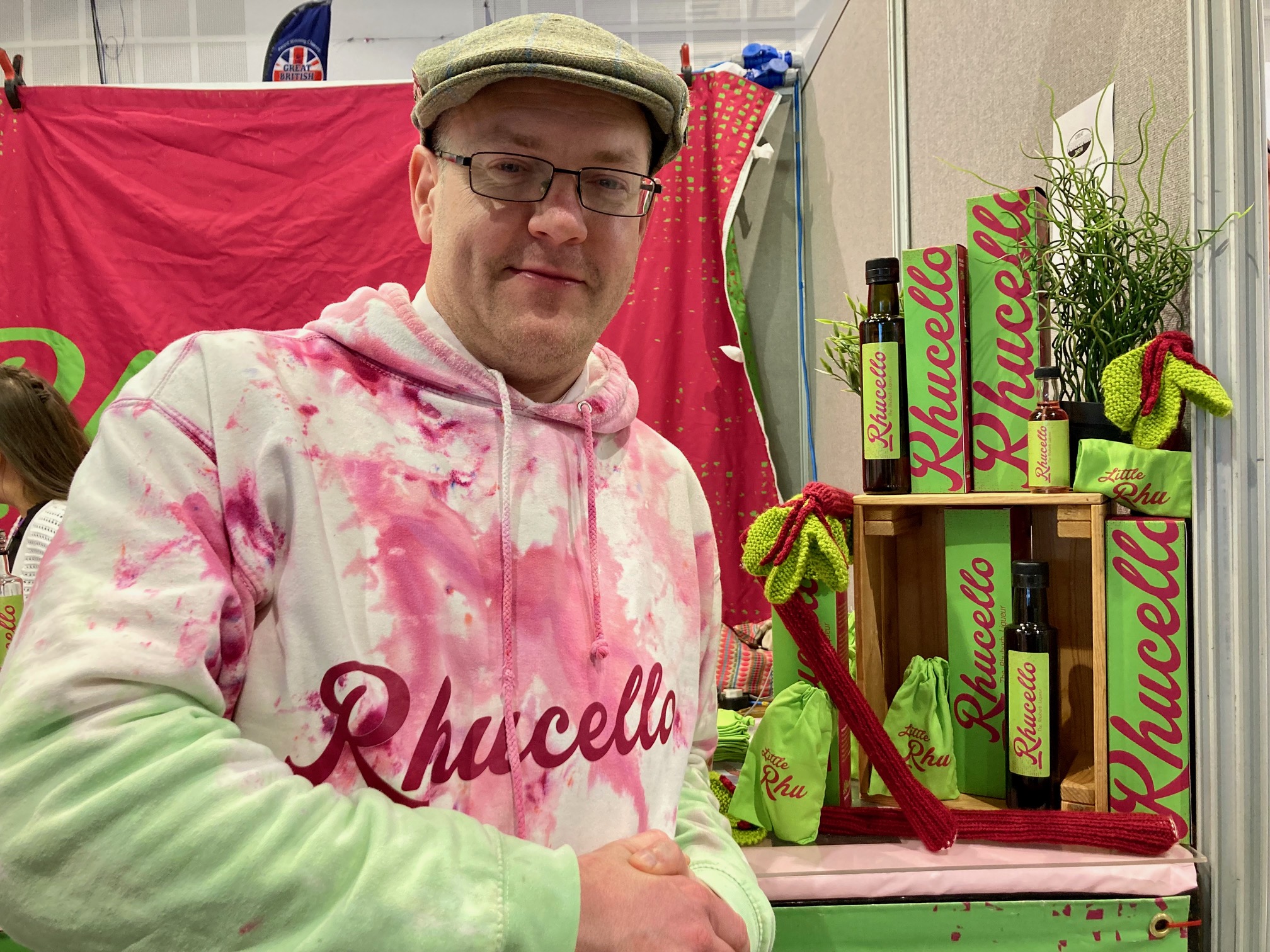
David Burnley hails himself as the founder, inventor and global CEO of Rhucello – a spirit infused with the fruity, unmistakable flavour of Yorkshire rhubarb.
“A long time ago, in the golden winter of 2014,” he says, “my football team went on a stag do around Amsterdam. We went on a tour around the Bols distillery, and they were giving us all these different flavoured samples, about 30-plus. My football team are all from Wakefield, famous for the Rhubarb Triangle, and there was a bit of a hullaballoo as we realised they didn’t have a rhubarb drink.”
Armed with a degree in chemistry and with a background as a chartered accountant, David felt he had the requisite skills to start a drinks business. And so he did, creating a business that revolves around bottling the essence of Wakefield for all to experience. It’s ideal as an aperitif, or served simply over ice.
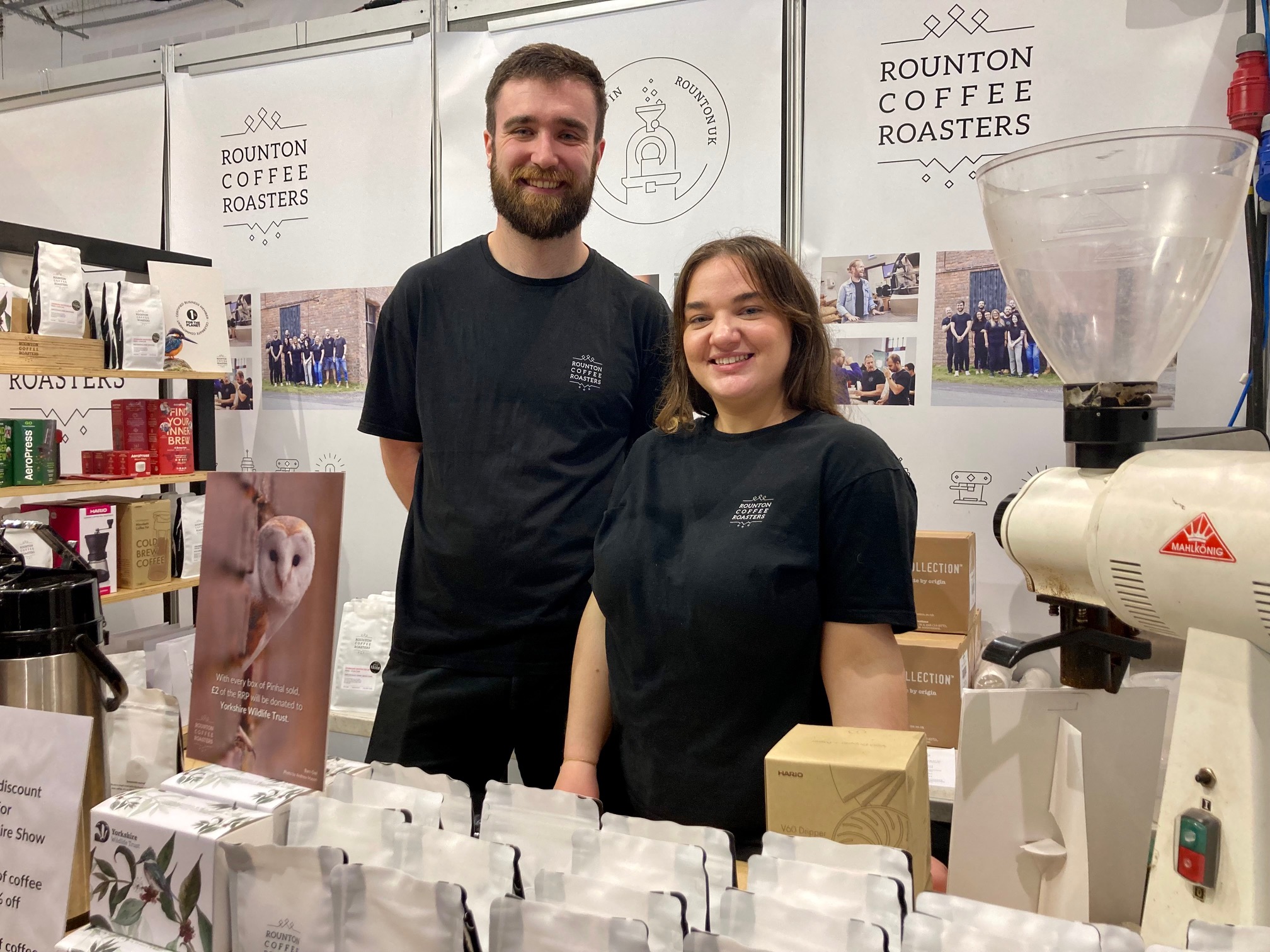
Yorkshire may be known for its tea, but there is a growing coffee industry too, including this brand, which sources beans direct from ethical farms in Brazil, Colombia and Peru, roasting them to perfection.
Rounton celebrates a decade in business this year. “We’ve got great relationships with our growers,” says Emily Benett. “Our director is always out and about in the different countries, meetings the farmers. And recently Pedro, from one of our Brazilian coffee farms, voted the most sustainable one in the world in 2021, was in our roastery.”
These relationships have allowed the brand to source the very best, with each variety cupped multiple times to ensure the roast perfectly fits the profile of the beans, as well as what sits best with customers.
“The Granary Blend is our signature coffee,” says Emily. It’s named after our roastery, and is a blend of beans from Brazil, El Salvador and Uganda. It’s an amazing blend, and really popular with our customers.”
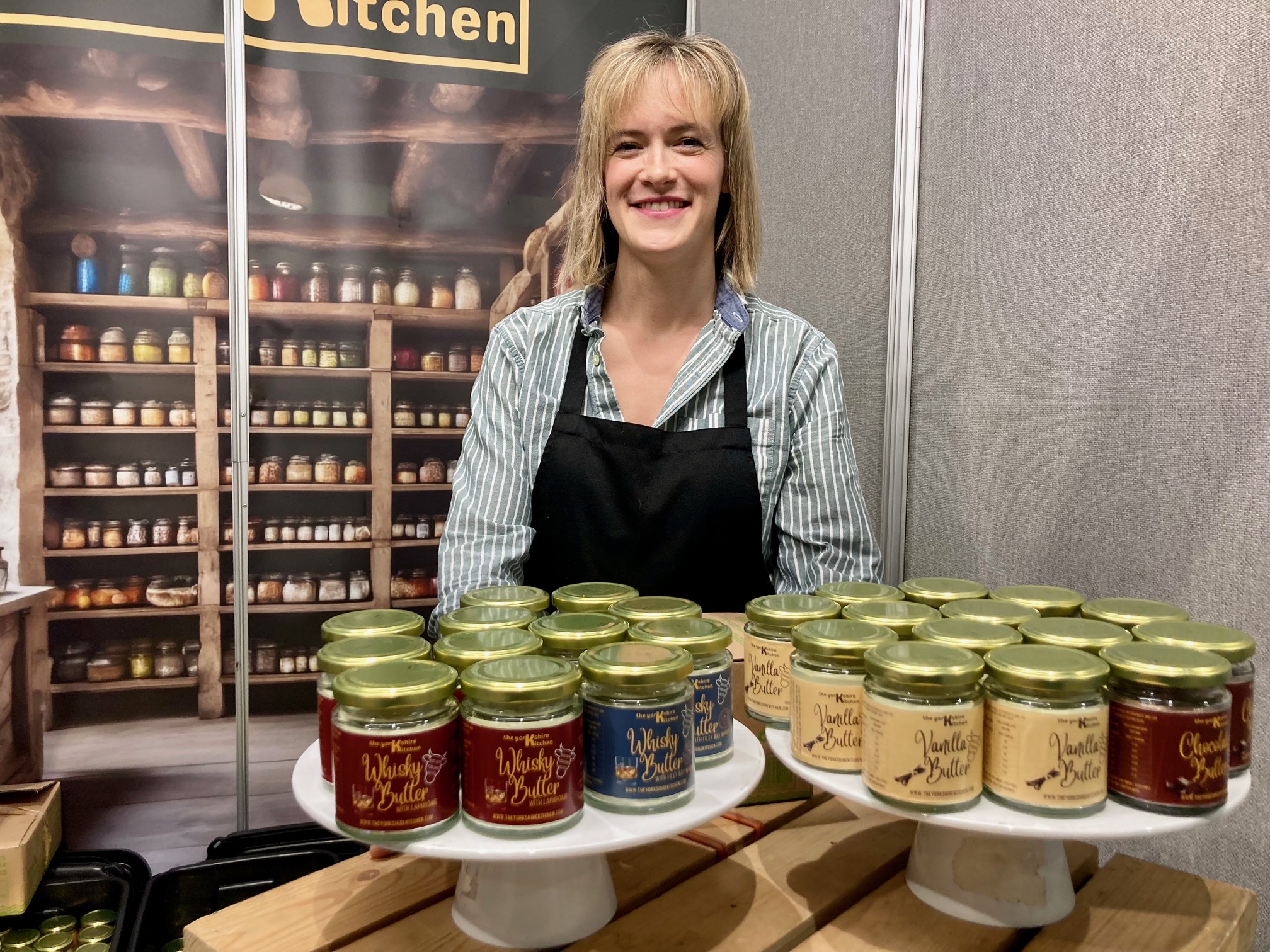
Compound, or flavoured, butters are starting to take off in the UK, and the Stokes family have tapped into the burgeoning category by launching a series of both savoury and sweet butters.
The Yorkshire Kitchen, says Sarah Stokes, started with jars of ambient sweet butters. “I was making brandy butter for mince pies and Christmas puddings,” she says, “and people used to tell me to sell it. I thought, if I can add brandy to the butter, why not other different flavours too?”
Each jar is completely natural, containing just whipped butter from North Yorkshire (which has a high fat content, says Sarah, to make it nice and cream), alongside sugar and real flavourings.
“The most popular is Honey & Cinnamon. It makes everything takes like cinnamon buns! People are not sure what to expect when they first taste it, but once they do they’re like ‘wow’.”
As for how to use the butters? Sarah says they can be smeared on toast, croissants or crumpets, or even dosed out over desserts such as rhubarb or apple crumble.”